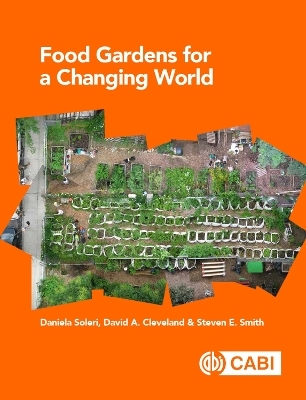
Food Gardens for a Changing World
CABI Publishing (Verlag)
978-1-78924-099-3 (ISBN)
Food gardening is becoming increasingly popular, as people look for new ways to live more sustainably and minimize harm to the environment. This book addresses the most pressing challenges facing food gardening in the 21st century - worldwide changes in climate, the environment, natural resources, and communities - and the basic biological, ecological and social concepts which influence our understanding. Examples throughout the text demonstrate how gardeners can use these theories to their advantage.
Daniela Soleri is an ethnoecologist whose research is on local and scientific knowledge systems in small scale agriculture and gardens, and collaboration between formal scientists and gardeners and farmers. This includes research with communities around the world in quantifying farmer practices, documenting risk assessment and cultural identity related to seeds, and investigating new semi-formal seed systems. She teaches a class at UCSB on "citizen" and community science, and is currently working with seed and garden activists and scientists to investigate crop diversity and adaptation in California food gardens. David A. Cleveland is a human ecologist who has done research and development project work on sustainable agrifood systems with farmers and gardeners around the world. His research and teaching have focused on sustainable, small-scale agrifood systems, including plant breeding and conservation of crop genetic diversity, and local and scientific knowledge and collaboration between farmers and scientists. His current research and teaching focus is on food system localization and diet change to improve health, mitigate anthropogenic climate change and environmental degradation, and promote food and climate justice, including at the University of California, in California, and globally. Steven E. Smith is a plant breeder, botanist and statistician whose research, training of students, and teaching cover those areas of expertise. His research interests reflect both his training in application-oriented plant breeding and his fascination with plant survival in natural plant communities in arid environments. For example, he has conducted research on conservation and evaluation of genetic diversity in alfalfa, and on plant physiological responses to drought and their significance in revegetation work in the arid southwestern US. Smith also provides consulting and support to other academic researchers on experimental design and analysis. He has won a number of awards in the University of Arizona's College of Agriculture in recognition of his teaching excellence.
PART I: Starting at the beginning: gardens and the big picture Chapter 1: What can Food Gardens Contribute? Gardens and Wellbeing Chapter 2: Changes coming to your garden Chapter 3: Responding to change as a food gardening strategy. Appendix - Worked formal garden experiments PART II: Starting the garden Chapter 4: Garden placement Chapter 5: How plants live and grow Chapter 6: Starting and caring for garden plants PART III: Garden management Chapter 7: Soil, nutrients, and organic matter Chapter 8: Water, soils, and plants Chapter 9: Managing pests, pathogens, and beneficial organisms Chapter 10: Saving seeds for planting and sharing
| Erscheinungsdatum | 17.04.2019 |
|---|---|
| Verlagsort | Wallingford |
| Sprache | englisch |
| Maße | 189 x 246 mm |
| Gewicht | 789 g |
| Themenwelt | Technik ► Lebensmitteltechnologie |
| Weitere Fachgebiete ► Land- / Forstwirtschaft / Fischerei | |
| ISBN-10 | 1-78924-099-9 / 1789240999 |
| ISBN-13 | 978-1-78924-099-3 / 9781789240993 |
| Zustand | Neuware |
| Informationen gemäß Produktsicherheitsverordnung (GPSR) | |
| Haben Sie eine Frage zum Produkt? |
aus dem Bereich


